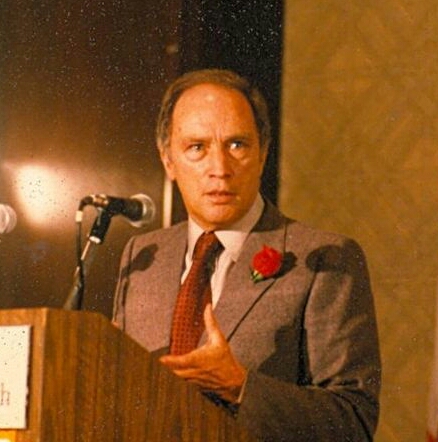“Of course a bilingual state is more expensive than a unilingual one — but it is a richer state.”
Remark in 1968, quoted in Improving Canada's Democracy (2006) by Terry Julian, p. 14
Joseph Philippe Pierre Yves Elliott Trudeau PC CC CH QC FRSC foi um político canadense que serviu como Primeiro-ministro do Canadá em duas ocasiões diferentes, primeiro de 1968 a 1979 e depois entre 1980 e 1984.
Trudeau é considerado uma figura carismática que entre o fim da década de 1960 até meados da década de 1980 dominou a cena política canadense. Trudeau governou o país por quinze anos, mais do que qualquer outro primeiro-ministro com exceção de William Lyon Mackenzie King.Seu governo foi marcado por avanços sociais e institucionais, com uma política econômica voltada com a esquerda. Em 1970, lidou com uma crise interna a respeito da situação da província de Quebec e preservou a unidade nacional, ajudando a forjar, dentro de uma sociedade multi-cultural, um sentimento pan-canadense mais forte. Instituiu várias reformas, como a implementação do bilinguismo oficial no Canadá . Também firmou o patriamento da constituição nacional e estabeleceu a Carta Canadense dos Direitos e das Liberdades. Foi criticado por ser considerado arrogante e por não lidar tão bem com as questões econômicas, além de centralizar o mecanismo de decisões políticas canadense, em detrimento da soberania de Quebec e da região das pradarias.Sua popularidade durante seu governo foi razoável, com o público tendo uma opinião mista e polarizada a respeito de suas conquistas no cargo. Contudo, acadêmicos o listam como um dos melhores primeiros-ministros da história do país, sendo chamado várias vezes como o "Pai do moderno Canadá".Seu filho mais velho, Justin Trudeau, que seguiu seus passos na carreira política, se tornou, em 2015, o 23º primeiro-ministro do Canadá.
Wikipedia

“Of course a bilingual state is more expensive than a unilingual one — but it is a richer state.”
Remark in 1968, quoted in Improving Canada's Democracy (2006) by Terry Julian, p. 14
Être votre voisin, c'est comme dormir avec un éléphant; quelque douce et placide que soit la bête, on subit chacun de ses mouvements et de ses grognements.
Addressing the Press Club in Washington, D.C. (25 March 1969) - Audio clip https://en.wikipedia.org/wiki/File:Trudeau_sleeping_with_an_elephant.ogg
“I don't really know what a cyclotron is but I am certainly very happy Canada has one!”
Visiting the TRIUMF cyclotron in (February 1976), as quoted in "A Canadian TRIUMF" http://www.alumni.ubc.ca/grad_gazette/grad_gazette_june_2005.html in Grad Gazzette [University of British Columbia] (June 2005)
Part 2, 1968 - 1974 Power And Responsibility, p. 149-150
Memoirs (1993)
Part 2, 1968 - 1974 Power And Responsibility, p. 117
Memoirs (1993)
“We aimed far and high, but we did not miss the mark.”
Part 4, 1979 - 1984 "Welcome to the 1980's", p. 340
Memoirs (1993)
Responses to reporters following the kidnapping by the FLQ of a provincial cabinet minister who was eventually murdered. CBC video archives http://archives.cbc.ca/IDC-1-71-162-429-21/unforgettable_moments/conflict_war/trudeau_just_watch_me (13 October 1970)
House of Commons Debate (24 October 1969)
Part 3, 1974 - 1979 Victory And Defeat, p. 190
Memoirs (1993)
“Paddling a canoe is a source of enrichment and inner renewal.”
As quoted in "Pierre Elliott Trudeau" profile in The Greatest Canadian at CBC http://web.archive.org/web/20041029152936/http://www.cbc.ca/greatest/top_ten/nominee/trudeau-pierre-know.html
“The essential ingredient of politics is timing.”
As quoted in The Rainmaker : A Passion for Politics (1986) by Keith Davey, p. 57; also in The Wordsworth Dictionary of Quotations (1998) by Connie Robertson, p. 439
Part 4, 1979 - 1984 "Welcome to the 1980's", p. 290
Memoirs (1993)
In reply to a high school student's question about what happened to Trudeau's promises of a "Just Society", in Regina, Saskatchewan (September 1972)[citation needed]
“I'm not leaving! I must stay.”
On the reviewing stand of a St. Jean Baptiste Day parade in Montreal, after being subjected to objects being thrown by demonstrators. (24 June 1968)[citation needed]
Speech (13 December 1980), quoted in It's great up north" by Henry Porter in The Observer (20 November 2005) http://www.guardian.co.uk/world/2005/nov/20/usa
Statement of 1970, as quoted in profile at the Canadian Museum of Civilizations http://www.civilization.ca/cmc/exhibitions/hist/biography/biographi270e.shtml, also quoted in York University: The Way Must Be Tried (2008) by Michiel Horn, p. 4
Part 3, 1974 - 1979 Victory And Defeat, p. 224
Memoirs (1993)
Farewell speech to the Liberal Party http://www.primeministers.ca/trudeau/bio_9.php?context=b (14 June 1984)
Defining liberalism at the 1968 Liberal leadership convention, as quoted in "History of the Liberal Party of Canada" (PDF at the Liberal Party website) http://web.archive.org/web/20070418135603/http://www.liberal.ca/pdf/docs/070417_lpc_history_en.pdf
Speech in Paul Sauvé Arena, Montreal, Quebec, six days before the Quebec referendum on independence. (14 May 1980)
“I've been called worse things by better people.”
When it was reported to him that President Richard Nixon had called him an "asshole" (1971), quoted in Absurdities, Scandals & Stupidities in Politics (2006) by Hakeem Shittu and Callie Query, p. 19
My only response was that I had been called worse things by better people.
Trudeau's account of the comment, in Memoirs (1993) by Pierre Elliott Trudeau, p. 218
Comment referring to the 1968 student protests in Paris, patterned after the 1967 remarks of Charles de Gaulle in Montreal on Quebec independence from Canada: "Vive le Québec libre!" (Long live free Quebec!), quoted in The Lima News (11 December 1968)